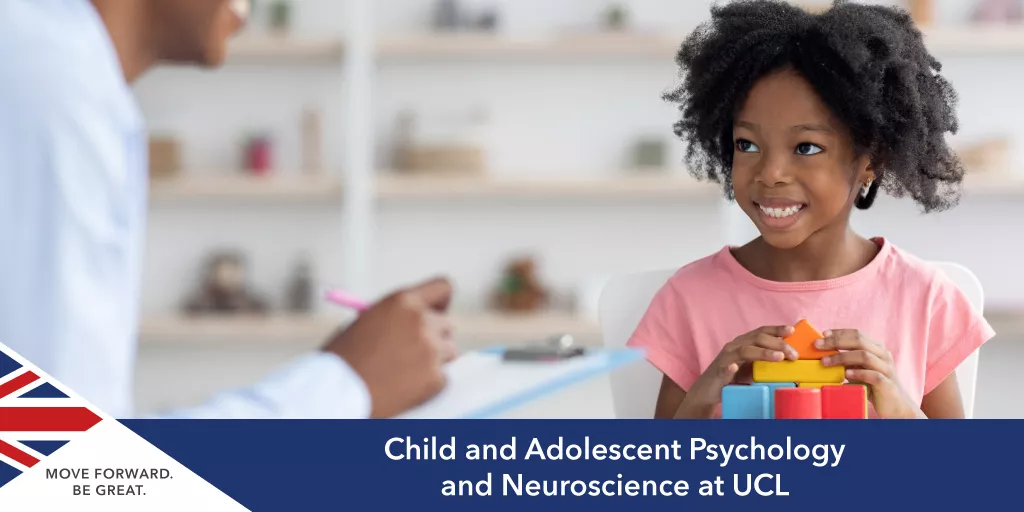Are you interested in understanding the complexities of the mental health of children and young people? If so, the Child and Adolescent Psychology and Neuroscience in Practice PG Dip at University College London is the perfect course for you. While studying this specialist PG Dip programme at UCL, you will have a comprehensive understanding of the subject, equipping students with the necessary tools to make a positive impact on the lives of children and young people.
Child and adolescent psychology and neuroscience have become crucial areas of study, offering valuable insights into the mental health of young individuals. With advancements in research and clinical practice, there is a growing need for professionals to stay up-to-date with the latest knowledge and apply it effectively in their work. Currently, the course fee for international students to study PGDip in Child and Adolescent Psychology and Neuroscience in Practice at UCL is £21,400.
Learn below more about studying Child and Adolescent Psychology and Neuroscience in Practice PGDip at UCL or book a free consultation with SI-UK India today.

Why Choose the Child and Adolescent Psychology and Neuroscience in Practice PG Dip at UCL?
Meeting the Needs of Professionals
The course caters to professionals who work with children and young people but lack a foundation in psychology and mental health. It is ideal for individuals such as social workers, teachers, teaching assistants, early years workers, youth justice staff, and support and administrative staff, among others. By enrolling in this program, these professionals can extend their knowledge, skills, and understanding of child and adolescent mental health, empowering them to provide better support and care.
Diverse Modules
The Child and Adolescent Psychology and Neuroscience in Practice PG Dip consists of five modules, each covering a vital aspect of the field:
- Child Mental Health and Wellbeing: A Developmental Perspective: This module focuses on understanding the developmental perspective of a child's mental health and well-being. Students will explore core concepts, theories, and models of evidence-based practice, gaining a comprehensive overview of the subject.
- Common Mental Health Difficulties in Childhood and Adolescence: In this module, students will delve into common mental health difficulties experienced by children and adolescents. They will develop an understanding of the challenges faced by young individuals and explore strategies for prevention and intervention.
- An Introduction to CBT, Mentalisation, and Psychoanalytic Approaches: This module introduces students to cognitive-behavioural therapy (CBT), mentalisation, and psychoanalytic approaches. They will learn about different therapeutic techniques and gain insight into how these approaches can be applied in practice.
- Working with the Impact of Childhood Trauma: The fourth module focuses on working with the impact of childhood trauma. Students will gain a deeper understanding of trauma and its effects on children and young people. They will explore evidence-based strategies for addressing trauma and promoting healing.
- Trauma-Informed Care in Education Settings: The final module centres around trauma-informed care in education settings. Students will learn how trauma can affect learning and development and discover strategies for creating safe and supportive environments within educational contexts.
Holistic Approach to Understanding Mental Health
The course emphasises the integration of multiple perspectives in understanding emotional development and the role of relationships in a child or young person's life. It explores the impact of trauma and adversity and the influence of parents/caregivers, family, peers, and community on mental health. By considering the interplay between psychological, developmental, neurobiological, and clinical factors, students gain a comprehensive and nuanced understanding of child and adolescent mental health.
Global Relevance and Cultural Context
The Child and Adolescent Psychology and Neuroscience in Practice PG Dip is designed to be accessible, relevant, and interesting to a global cohort. It provides opportunities for reflection on cultural and social contexts, allowing students to share practices across different settings and countries. The course recognises the importance of incorporating traditional knowledge alongside contemporary disciplines like neuroscience to address modern challenges impacting young people's mental health.
Entry Requirements
Currently, the entry requirements for Child and Adolescent Psychology and Neuroscience in Practice PGDip at UCL are:
- A minimum of an upper second-class Bachelor’s degree from a UK university or relevant international qualification.
- The English language requirement for this course is Level 2.
Career Progression
For international students seeking a return on investment, this program offers valuable career progression opportunities. By completing the PG Dip, professionals can enhance their skills, demonstrate a commitment to the field, and lay the groundwork for further study or clinical training. The course equips students with the necessary expertise to make a meaningful impact on the lives of children and young people, opening doors to diverse career paths within the mental health sector.
Study at UCL
SI-UK is the official postgraduate admission partner of UCL globally. With SI-UK, you will get exclusive insight into the course and build a solid application to secure your place at UCL for studying PGDip in Adolescent Psychology and Neuroscience in Practice.
From common mental health difficulties to trauma-informed care, the Adolescent Psychology and Neuroscience course at UCL covers a wide range of topics, ensuring students gain a comprehensive overview of the subject. Book a free consultation with SI-UK today to learn more or to begin your application for the upcoming intake.
FAQ
Is this course suitable for individuals without a background in psychology or mental health?
Yes, the Child and Adolescent Psychology and Neuroscience in Practice PG Dip is specifically designed for professionals working with children and young people who do not have a foundation in psychology or mental health. The course offers an opportunity to extend knowledge and skills in this area.
Can I choose which modules to study within the program?
Yes, students can select any four out of the five modules offered in the program based on their interests and professional goals.
How does this program incorporate cultural and social contexts?
The course encourages reflection on cultural and social contexts, providing opportunities to share practices across different settings and countries. It recognises the importance of diverse perspectives in understanding child and adolescent mental health.
Will this course lead to a clinical qualification?
No, the Child and Adolescent Psychology and Neuroscience in Practice PGDip is an academic course and does not provide clinical training. However, it does offer a solid foundation for further study or clinical training in the future.



 I sincerely thank SI-UK for getting me accepted to UCL. The MSc in Urban Development and Planning is extremely competitive, but the right guidance provided by SI-UK made my dream of studying at University College London a reality. The services were exceptional from beginning to end.
I sincerely thank SI-UK for getting me accepted to UCL. The MSc in Urban Development and Planning is extremely competitive, but the right guidance provided by SI-UK made my dream of studying at University College London a reality. The services were exceptional from beginning to end. 

